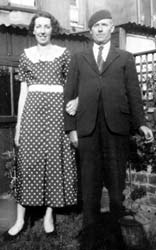

Albert de Montfort (left, right), the fanatical leader of the largest maquis cell in central France and one of many outspoken opponents of Hitler's activities, was incensed at the destruction that the Second World War was wreaking all through France. Running out of his house he would scream: 'Who's going to clean all this up?' after convoys of departing German panzer tanks.
Realising that he needed to take matters into his own hands if anything were to be saved, from 1941 onwards he organised a crack commando of resistant French loyalists who were prepared to risk their lives, and those of other family members, to sabotage Nazi attempts to break what little glass remained in France. Their heroic efforts included clandestine midnight sorties to cover vulnerable panes with criss-crossed adhesive tape, as well as attempts to shield unbroken glass with hand-held 'deflectors' during any close-combat fighting that broke out in the streets of towns and cities.
The 'deflectors', made from thickened sheet steel, were carried high above the head in a brave effort to protect uncovered windows from stray bullets and ricochets. The carriers, men of extraordinary strength and obstinacy, selflessly dodged their way through intense gunfire to hold their deflectors in front of one unbroken pane after another, their passion for glass as strong as their hatred for the marauding 'bosch' who sought to threaten it. Many sacrificed their lives to preserve what they believed to be a national heritage.
By the end of the war the de Montfort group had lost over twenty men to direct gunfire, and another three to indirect splintering, but had preserved seven whole shop fronts along the main street in Orleans, several panes in a rural greenhouse and almost thirty percent of the glass in Orleans Cathedral. At a memorial service held in 1946, the mayor of Orleans dedicated a special plaque to the efforts of the dead men and wept openly as he asked their families to take comfort from the knowledge that they had not died in vain. His speech concluded with the now-famous and oft-quoted statement:
Damaging post-war rumours that the Selman-Troytt family had dined often with Hitler at Berchtesgaden, and had financed part of his destructive push through France, were later denied by James (spokesman for the 2nd Triumvirate) from the Bahamas where he was staying with the Duke of Windsor (the former King Edward VIII) while both shared memories of visits to Der Führer and drank to happier times.
Details of earlier stages of Selman-Troytt foreign expansion can be found here as well as in the essay The 'Glazing Wars' by Finlay Finlayson.








